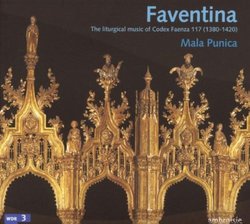| All Artists: Codex Faenza 117, Mala Punica, Memelsdorff Title: Faventina: The Liturgical Music of Codex Faenza Members Wishing: 1 Total Copies: 0 Label: Naive Original Release Date: 1/1/2007 Re-Release Date: 11/20/2007 Genre: Classical Styles: Chamber Music, Historical Periods, Classical (c.1770-1830) Number of Discs: 1 SwapaCD Credits: 1 UPC: 822186001059 |
Search - Codex Faenza 117, Mala Punica, Memelsdorff :: Faventina: The Liturgical Music of Codex Faenza
 | Codex Faenza 117, Mala Punica, Memelsdorff Faventina: The Liturgical Music of Codex Faenza Genre: Classical |
Larger Image |
CD Details |
CD ReviewsEntering a different world R. Hakemulder | Jordan | 06/11/2008 (5 out of 5 stars) "This latest recording by Mala Punica presents the complete liturgical musical glosses found in the Codex Faenza 117, an Italian manuscript of the Ars Nova. The extensive and scholarly liner notes explain that musical glosses substitute or complete simple melodies with ever richer and more complex variations. In the late fourteenth century four scribes added instrumental glosses to the plainchant in this manuscript, so producing polyphonic versions that, Mala Punica's research indicates, can be performed in a variety of ways: combining and/or alternating instruments and voices, and combining the glosses with Gregorian, rhythmic versions of Gregorian, monodic and simple polyphonic chanting. The result is fascinating, as with all Mala Punica's recordings (see [[ASIN:B000005E50 Missa Cantilena] for instance]. A first hearing may disappoint, since this work is not characterised by great melodiousness (as some other Ars Nova music is), but listen to it a few times, without distractions, and one realises the beauty of this music. It is colourful, fairly complex, and brings one back to a time when religious music stood at the centre of society and artistic development. The performances are virtuoso as well as inspired, and offer different "sounds" for the various works. One of the highlights is Sicut esar in principio, on a dance melody - the notes explain that there is some evidence of the existence of forms of dance intended for the conclusion of masses or offices. The Marian Vespers are the earliest surviving polyphonic Vespers, and Kyrie Orbis Factor was restored digitally from the manuscript... a later scribe had erased it. In summary: a great disk opening up the world of Italian Ars Nova a bit further."
|
